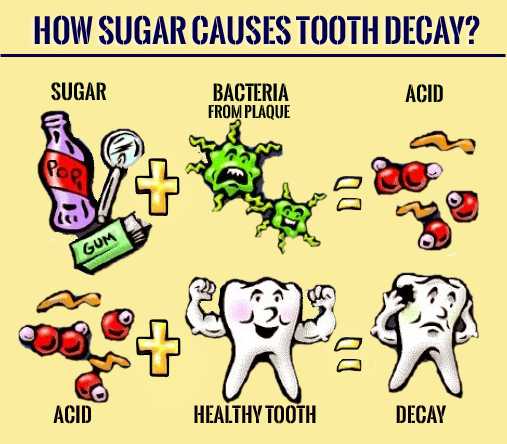Indeed, it is summer and beverages are often indulged in. Children today tend to consume more soft drinks than children did 10 years ago. But before they continue this habit it is time to learn about the effects of sugar on their teeth.
Tooth decay, or ‘dental caries’, occur when acid from within the mouth attacks the enamel and dentine of the teeth causing holes or cavities to form. The acid is produced by bacteria that are found within the plaque – a sticky and thin film that repeatedly forms over the teeth.
When sugar is consumed it interacts with the bacteria within the plaque to produce acid. This acid is responsible for tooth decay because it slowly dissolves the enamel creating holes or cavities in the teeth. Tooth decay can influence tooth abscesses, which may result in the tooth having to be removed.
Despite the decreasing levels of tooth decay over the past decades, it still remains one of the most common problems in India, second only to the common cold. It is estimated that 1 in 3 adults suffers from dental caries and close to 1 in 4 children equally suffer from some form of tooth decay.
Sugar and tooth decay:

Sugars in food and drinks play a major role in the development of dental caries. Bacteria within the plaque utilize the sugar as energy and release acid as a waste product, which gradually eradicates the enamel in the teeth.
In 2010, the World Health Organisation (WHO) commissioned a systematic literature review to answer a series of questions relating to the effects of sugars on dental caries. The systematic review showed consistent evidence of moderate quality supporting a relationship between the number of sugars consumed and dental caries development.
There was also evidence of moderate quality to show that dental caries is lower when free sugars intake is less than 10% of energy intake. Dental caries progresses with age, and the effects of sugars on the dentition are lifelong.
Even low levels of caries in childhood are of significance to levels of carries throughout the life-course. Analysis of the data suggests that there may be a benefit in limiting sugars to less than 5% of energy intake to minimize the risk of dental caries throughout the life course.
Who is at risk of tooth decay?
Everyone is at risk of tooth decay, but children and adolescents have a higher risk of cavity formation. Dental caries is the most common cause of tooth loss in young people. Plaque starts to build up on teeth only 20 minutes after we begin eating and if it is not removed completely, tooth decay starts.
People who regularly consume sugar have a higher risk of developing dental caries, particularly if the food they eat is sticky or consumed in between mealtimes. Sugar-containing snacks and sugar-sweetened drinks have particularly bad effects on teeth.
People who smoke and consume alcohol also have more risk of the cavity. The prevalence of dental caries is also associated with social factors – where adults from lower income households are more likely to suffer from dental caries than those from higher-income households (37% compared with 26%).
Dietary Advice:
We currently consume far too much sugar in our diets. The report published by the WHO ( World Health Organization) highlight the need for a reduction in sugars intake to 5% of our energy intake.
How much Sugar intake is ideal for Adults?
7 teaspoons/cubes or 30g of sugar per day is ideal for an adult.
How much sugar children can Consume?
- 4-11 age- 19 gm sugar can be recommended for children.
- 5-11 age- The recommendation for children is 24g for children.
This 5% limit is far below the current intake which is of 11.9% in children aged 1.5 to 3; 14.7% in children aged 4 to 10; and 15.6% in children 11 to 18. It is also thought that adherence to the 5% recommended sugar intake would halt the increase in obesity.
Other ways to reduce dental caries include :
- Brushing teeth thoroughly twice a day with fluoride-containing toothpaste as well as flossing daily.
- Reducing the amount of sugars-containing sticky food, and rinsing the mouth with water if they are consumed.
- Reduce snacking; which helps minimize the production of acid in the mouth.
- Reduce the consumption of sugar-sweetened beverages.
- Only eat sugary foods at mealtimes.
- Whole fruit is not harmful to your teeth.
Expert Opinion
Dr. Zita Antao Dental Director of Sabka dentist says “If your children too much behind sugary drinks its good to keep them in meal time. And make them the habit of rinsing mouth after meal”.
Dr. Manan Dhulia Dental Director of Saka dentist says “Cavities are painful to children and difficult to children. Hence teaching them necessary methods to avoid is an important thing of parenting”.
Dr. Preethi Nagarajan Dental Director of Sabka dentist says “Beverages not only threat to children, but frequent consumption of beverages increases the risk of dental erosion among normal people also”.





